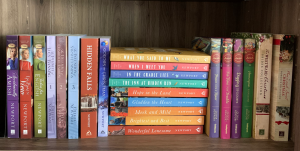 I get an F in reading. You probably do too.
I get an F in reading. You probably do too.
I read lots of books. And blogs. And magazines. And online articles. (Newspapers, not so much.)
And I get an F.
We’ve turned into a culture of scanners. We might read the first two or three lines of a piece of writing. After that, we read less and less of the lines that follow. Our scanning ends up in the shape of an F.
A couple of years ago, I read a book called The Shallows: What the Internet is Doing to Our Brains by Nicholas Carr. I don’t typically keep extensive notes on books I read, but I did on this one. It fascinated me. Here’s one of the quotes I saved.
“The ability to skim text is every bit as important as the ability to read deeply. What is different, and troubling, is that skimming is becoming our dominant mode of reading. Once a mean to an end, a way to identify information for deeper study, scanning is becoming an end in itself—our preferred way of gathering and making sense of information of all sorts” (p. 138).
As a writer, perhaps I should be perturbed by this research conclusion. As a reader, though, I’m guilty as charged.
Other writers have a small window of opportunity to capture my attention and lure me into a fuller experience, whether fiction or non-fiction. The fact that I know this is true for me certainly convicts me that I don’t have long to pull readers in, either.
So two questions.
1. How many people are still reading at this point in my post?
2. What do you think this reality means for the future of books?
In the meantime, I am still at work on the Avenue of Dreams and Valley of Choice series. Maybe I’ll beat the odds.





1st- I read all the way through! 🙂
2nd- I’m not certain. But I can say that I’m guilty as charged also. A friend commented recently that she couldn’t believe I’d read a book so quickly. After I thought about it, I told her that part of it was that I don’t read every word and sometimes not even every line. I will also say this, I listened to Lucy Banning on audiobook in my car, and it took me a little bit of time to adjust to hearing every single word out loud. I realized that I wouldn’t normally read every word. (Not to worry, I ended up enjoying every single minute of your story. 🙂 But I had never really thought about how I read and how quickly before. You make some very good points.
Okay, sorry for a wordy post. I’m so bad at that. 🙂
Thanks for hanging in there all the way through, Kara!
I love listening to audiobooks, but, like you, at times I am aware that I would probably be flipping pages. I do so love a book that makes make want to read or hear every word.
Hey Olivia – yep, I read to the end of the post 🙂
I’ve always been a fast reader which does mean I have always scanned (rather than skimmed! Semantics?!)rather than read each individual word. It stood me in good stead during my university degrees and now as a reviewer as I can get through a book in a few hours. So it is hard for me to know if I’m taking less in now than I did in the past – it has been a natural reading process for me. It’s how I read and I suppose given I passed all my uni subjects I must have been taking something in!
That said, one thing I have noticed since beginning to read newspapers online rather than on paper, there are a lot more typos sneaking in so editors are not as particular either!
I’m sure a lot of us got through our degrees that way! The same author I cited says that writing (and publishing) used to be about expressing learning and original thought, and now the vast majority of writing is social media and communication, i.e., texting. Writing used to be static–once in print, it didn’t change. Now it’s fluid. It can always be fixed. That’s perhaps one reason why more and more people tolerate typos! That is speculation for another post.